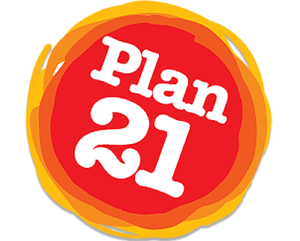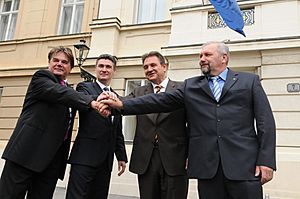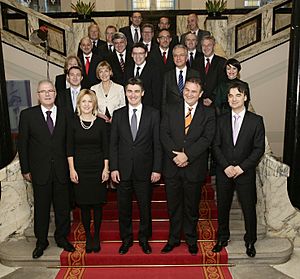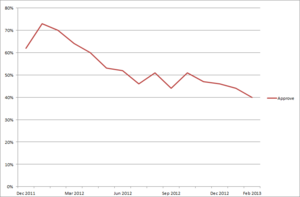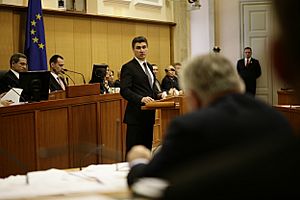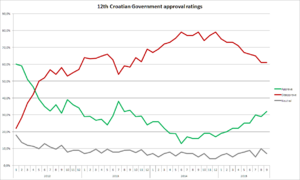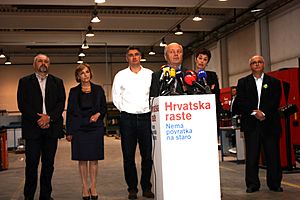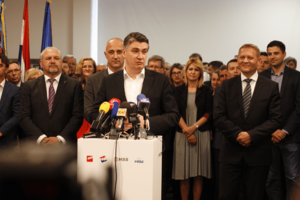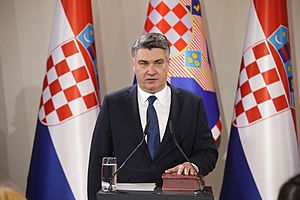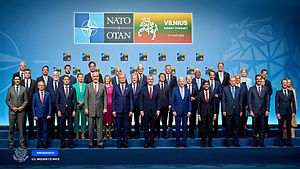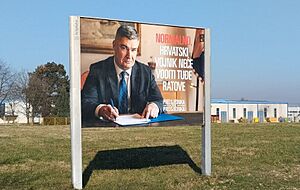Zoran Milanović facts for kids
Quick facts for kids
Zoran Milanović
|
|
|---|---|
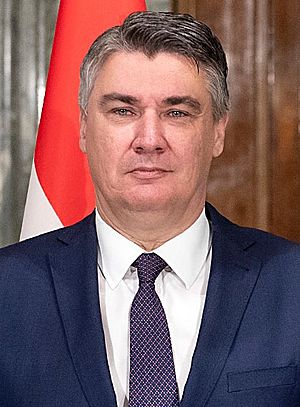
Milanović in 2021
|
|
| President of Croatia | |
| Assumed office 19 February 2020 |
|
| Prime Minister | Andrej Plenković |
| Preceded by | Kolinda Grabar-Kitarović |
| Prime Minister of Croatia | |
| In office 23 December 2011 – 22 January 2016 |
|
| President | Ivo Josipović Kolinda Grabar-Kitarović |
| Deputy | Radimir Čačić Branko Grčić Milanka Opačić Vesna Pusić |
| Preceded by | Jadranka Kosor |
| Succeeded by | Tihomir Orešković |
| Leader of the Opposition | |
| In office 22 January 2016 – 26 November 2016 |
|
| Prime Minister | Tihomir Orešković Andrej Plenković |
| Preceded by | Tomislav Karamarko |
| Succeeded by | Davor Bernardić |
| In office 2 June 2007 – 23 December 2011 |
|
| Prime Minister | Ivo Sanader Jadranka Kosor |
| Preceded by | Ivica Račan Željka Antunović (Acting) |
| Succeeded by | Jadranka Kosor |
| President of the Social Democratic Party | |
| In office 2 June 2007 – 26 November 2016 |
|
| Deputy | Zlatko Komadina Gordan Maras Milanka Opačić Rajko Ostojić |
| Preceded by | Ivica Račan Željka Antunović (Acting) |
| Succeeded by | Davor Bernardić |
| Personal details | |
| Born | 30 October 1966 Zagreb, SR Croatia, Yugoslavia |
| Political party | Independent (2020–present) |
| Other political affiliations |
Social Democratic Party (1999–2020) |
| Spouse |
Sanja Musić
(m. 1994) |
| Children | 2 |
| Parents |
|
| Alma mater |
|
| Signature |  |
Zoran Milanović (born 30 October 1966) is a Croatian politician. He is currently the president of Croatia. He was first elected president in 2020 and was re-elected in 2025 with strong voter support. Before becoming president, he served as the prime minister of Croatia from 2011 to 2016. He was also the leader of the Social Democratic Party (SDP) from 2007 to 2016.
After finishing law school at the University of Zagreb, Milanović began working for the Ministry of Foreign Affairs. From 1996 to 1999, he was an advisor at the Croatian mission to the European Union and NATO in Brussels. In 1999, he joined the SDP. He earned his master's degree in European Union law in 1998. In 2003, he became an assistant to the Croatian foreign minister for political affairs.
In June 2007, Milanović was chosen as the president of the SDP. This happened after the death of the party's long-time leader and former prime minister, Ivica Račan. Under Milanović's leadership, the SDP came in second place in the 2007 Croatian parliamentary election. They were not able to form a government at that time. Despite this, he was re-elected as party leader in 2008.
In 2011, Milanović helped create the Kukuriku Coalition. This group brought together four political parties from the center and center-left. The coalition won a clear majority in the 2011 Croatian parliamentary election. The SDP became the largest party in the Croatian Parliament. Milanović became Prime Minister on 23 December 2011, after Parliament approved his government.
Contents
Early Life and Education
Zoran Milanović's father, Stipe Milanović (1937–2019), was an economist. His mother, Đurđica "Gina" (née Matasić), was a former teacher of English and German. His family roots on his father's side are from the area around Sinj. He also mentioned that his father's family came from Livno, Bosnia and Herzegovina, a century or two ago.
Milanović was secretly baptized by his maternal grandmother Marija. He was given the baptismal name Marijan. He grew up in the neighborhoods of Knežija and later Trnje in Zagreb. He had a brother, Krešimir, who passed away in 2019. Milanović enjoyed sports like football, basketball, and boxing.
In 1985, he started studying law at the University of Zagreb. After completing his military service, he returned to his studies in 1986. After college, Milanović worked as an intern at the Zagreb Commercial Court. In 1993, he joined the Ministry of Foreign Affairs. A year later, he took part in an OSCE peacekeeping mission in the Nagorno-Karabakh region. In 1994, he married Sanja Musić. They have two sons, Ante Jakov and Marko. Besides Croatian, he speaks English, French, and Russian.
Becoming Party Leader
In 1999, Zoran Milanović officially joined the Social Democratic Party (SDP). After the SDP won the 2000 elections, he was put in charge of working with NATO. Three years later, he became an assistant to Foreign Minister Tonino Picula. He left this role after the 2003 elections when a different party came to power.
As an SDP member, in 2004, he became a member of the party's new executive committee. He also became the International Secretary, handling contacts with other political parties. In 2006, he briefly served as the party's spokesman. In September 2006, he became the SDP's coordinator for a specific election area in the 2007 elections.
On 2 June 2007, a special party meeting was held in Zagreb. This was because the first party president and former prime minister, Ivica Račan, had resigned. Milanović decided to run for party president, even though he was considered a new face in the party. He ran against Željka Antunović, Milan Bandić, and Tonino Picula. Milanović won the second round of voting, becoming the new president of the SDP.
2007 Parliamentary Election Outcome
The 2007 Croatian parliamentary election was very close. The SDP won 56 seats, which was 10 fewer than the main rival party, HDZ. This close result meant that both sides could potentially form a government if they could get enough support. In the end, Ivo Sanader of the HDZ managed to form a government. The Social Democrats remained in the opposition.
Despite losing the election, the SDP achieved its best result ever and had its largest group of members in Parliament. Milanović remained party president. In the 2008 leadership election, he won again with almost 80 percent of the votes.
Leader of the Opposition (2007–2011)
With 56 seats, the SDP became the second-largest party in Parliament after the 2007 election. This made Zoran Milanović the unofficial leader of the opposition. Milanović often criticized the government led by Ivo Sanader, especially regarding the economy and fighting corruption.
In September 2008, Milanović visited Bleiburg to remember the victims of the Yugoslav Communists. He was the second leader of the Social Democratic Party of Croatia to visit this site.
The 2009 local elections were held in May. The Social Democrats gained a lot of support in some cities that usually voted for the HDZ, like Dubrovnik and Šibenik. They also kept control of major cities where they traditionally had strong support, such as Zagreb and Rijeka.
On 1 July 2009, Ivo Sanader resigned as prime minister. His deputy, Jadranka Kosor, took over. Parliament approved her and the new government. This made Kosor the first woman to be appointed prime minister of Croatia. After Sanader's sudden resignation, the HDZ's support in polls dropped significantly. Milanović argued that the prime minister's resignation meant that an early general election was needed. However, the government decided to finish its term.
In 2008, Croatia's process of joining the European Union was stopped due to a border dispute with Slovenia. Sanader and his Slovenian counterpart, Borut Pahor, could not resolve their differences. This meant Croatia's EU entry was on hold. Later, Kosor and Pahor met several times to try and solve the border issue. They reached an agreement that allowed Croatia to continue its EU negotiations. This agreement was signed in Stockholm on 4 November 2009. Milanović and most SDP members voted for the agreement. However, he criticized the government for taking so long to reach a solution.
The 2008 financial crisis affected many European countries, including Croatia. Many jobs were lost, and unemployment increased. Consumer spending dropped, causing problems for businesses. The declining economy led to a decrease in public support for the prime minister and the government. Milanović criticized the government's slow response and actions, which he felt did little to help the economy. The recession and high unemployment continued into 2011, leading to many anti-government protests across the country.
2011 Parliamentary Election
On 28 October, members of Parliament voted to dissolve Parliament. The President of the Republic, Ivo Josipović, agreed to dissolve Parliament on 31 October. He scheduled the election for Sunday, 4 December 2011.
In the 2011 parliamentary election, the SDP joined three other left-wing parties to form the Kukuriku coalition, led by Milanović. The Kukuriku coalition won the election with a clear majority of 81 seats. This was the first election where the rival HDZ was not the leading individual party in Parliament.
Prime Minister (2011–2016)
Milanović presented his government to the Parliament on 23 December, 19 days after the election. The discussion ended with 89 members voting in favor of the Milanović government. This included 81 members from the Kukuriku coalition and 8 members representing national minorities. The transfer of power happened the next evening. Jadranka Kosor welcomed Milanović to the government's official meeting place and handed him the necessary documents.
Milanović became Prime Minister at 45 years old, making him one of the youngest prime ministers since Croatia became independent. His government was also the youngest, with ministers having an average age of 48. Members of his government came from three of the four parties in the winning coalition. Milanović was re-elected as president of the SDP in the 2012 leadership election, running as the only candidate.
Domestic Policies and Challenges
The Milanović government began its term by introducing several new laws. In 2012, a law on medically assisted fertilization was passed. Health education was also introduced in all elementary and high schools. Milanović announced plans to further expand rights for same-sex couples. During the 2011 elections, the Kukuriku coalition promised to publish a list of veterans from the Croatian War of Independence. This list was made public in December 2012.
In the Trial of Gotovina et al, Ante Gotovina and Mladen Markač were found not guilty in November 2012, after an earlier guilty verdict in April 2011. Milanović called the ruling "an important moment for Croatia." In September 2013, protests began against the use of bilingual signs with the Serbian Cyrillic alphabet in Vukovar. Milanović criticized these protests, stating that the "rule of law must prevail."
On 1 December 2013, a referendum was held in Croatia. It proposed to define marriage as a union between a man and a woman in the constitution. Milanović opposed this proposal and voted against it. The government also advised citizens to vote against it. However, the referendum passed with 65% of votes in favor, though only 38% of voters participated. Milanović expressed his disappointment that the referendum took place. He announced that a new law, the Life Partnership Act, would be passed. This law would allow same-sex couples to form a "lifetime partnership" with similar rights to marriage, except for adoption. The Parliament passed this act in July 2014.
A difficult economic situation weakened public support for Milanović's government. This was seen in the 2013 local elections. In the first European Parliament elections in Croatia in 2013, the SDP won 32% of the votes and five members of the European Parliament. The following year, the SDP won 29.9% in the 2014 European Parliament elections and four members. Milanović and his party supported Ivo Josipović in the presidential elections. However, Kolinda Grabar-Kitarović from the HDZ won these elections.
War Veterans Protest
Croatian war veterans started a protest in Zagreb in October 2014. They called for the resignation of Predrag Matić, the war veterans minister. They also wanted a new law to guarantee their rights. Milanović rejected their demands. He stated that his government had not harmed the dignity of Croatian defenders or the importance of the Homeland War.
The protest continued throughout 2015. In May 2015, it became more intense when veterans clashed with police in front of the government building. Milanović said his government had not reduced their rights and that he was open to talks, but would not be pressured. He accused the opposition party HDZ of using the veterans for political reasons. Tomislav Karamarko, the HDZ president, denied this. Milanović met with veteran representatives in June, but the protest continued.
On 4 August 2015, Milanović and the Defence Minister Ante Kotromanović insisted on a military parade in Zagreb. This parade by the Croatian Armed Forces honored Victory Day, celebrating 20 years since Operation Storm. Milanović thanked everyone who sacrificed their lives for Croatia's freedom. He also thanked Franjo Tuđman, Croatia's first president, who led the country during the war. He said that Croatia was not celebrating war or suffering, but freedom, peace, and victory.
Economic Policies
The Milanović government made several changes to taxes to deal with the difficult economic situation. They increased the standard Value-added tax (VAT) from 23% to 25%. They also introduced new VAT rates for goods and services that were not taxed before. Social insurance payments and public-sector wages were cut. In October, a law was passed that allowed companies unable to pay their bills to stay open during bankruptcy and reorganize their debts.
The government managed to reduce the budget deficit to 5.3% in 2012. However, the country's economy shrank by 2.2%, and public debt reached 69.2%. Milanović's time in office saw several cuts to Croatia's credit rating.
Several large construction projects began in 2012. These included a new passenger terminal at the Zagreb International Airport. However, some projects were put on hold. The government stated that construction of the Pelješac Bridge would start in spring 2016. Milanović supported further oil and gas exploration in the Adriatic Sea.
In November 2012, Radimir Čačić, the Minister of Economy and Deputy Prime Minister, resigned. He was replaced by Ivan Vrdoljak. In 2013, a new law was introduced to control the informal economy and reduce tax avoidance. The government focused on the shipbuilding industry and privatized state-owned shipyards by May 2013. To manage public debt, the government proposed a plan in 2013 to allow private companies to manage Croatian highways. This plan was expected to bring in about 2.5 billion euros. However, trade unions and citizen groups opposed this idea. They collected signatures for a referendum on the highways. Although the constitutional court ruled against a referendum, the government withdrew its decision. Instead of leasing the highways to foreign investors, the government decided to offer shares in them to Croatian citizens and pension funds.
The Pension Insurance Act of January 2014 increased the official retirement age from 65 to 67. The early retirement age also increased from 60 to 62. The unemployment rate reached its highest point in February 2014 at 22.7%. Since then, it has been decreasing. In May 2014, Milanović dismissed the Finance Minister, Slavko Linić, over a property deal. Boris Lalovac was appointed in his place. Changes to the Personal Income Tax were made in 2015. The amount of income that was not taxed was increased. This led to higher net salaries for about one million people. In January 2015, the government decided to freeze exchange rates for Swiss francs for a year. This was because the franc's value had risen, making loans in that currency more expensive. In August 2015, Milanović announced that Swiss franc loans would be changed into euro-denominated ones.
The economy shrank in 2013 and 2014. However, in the last part of 2014, the economy grew by 0.3% for the first time since 2011. On 28 August 2015, it was announced that the economy had grown by 1.2% for the third quarter in a row. This marked Croatia's exit from a six-year economic recession. The budget deficit decreased in 2015 to 3.2% of the economy's total value. Public debt was at 86.7% of the economy's total value.
Foreign Policy and European Union
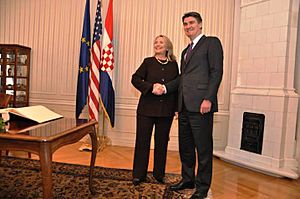
Milanović's foreign policy initially focused on Croatia joining the European Union. On 22 January 2012, an EU accession referendum was held. About 66.25% of voters were in favor, and 33.13% were against. Around 47% of eligible voters participated. On 11 March 2013, Milanović signed an agreement with Slovenian Prime Minister Janez Janša. This agreement was about the issue of Ljubljanska banka, a bank that closed in 1991 without paying back its Croatian customers. Croatia agreed to stop a lawsuit against the bank. Slovenia promised to approve Croatia's EU membership. Slovenia approved Croatia's membership on 2 April 2013. After all 27 member states signed the EU accession treaty, Croatia joined the European Union on 1 July 2013. It became the 28th member state.
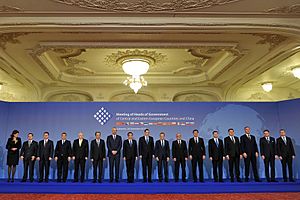
On 27 February 2012, Milanović visited Bosnia and Herzegovina. This was his first trip to a foreign country as prime minister. The next day, he visited Široki Brijeg and Mostar. There, he met with members of the Croatian National Assembly, a political group of Croats of Bosnia and Herzegovina. Milanović said that Croatia would support Bosnia and Herzegovina's entry into the European Union.
Due to the civil war in Syria, Milanović asked Croatian companies working in Syria to leave the country in February 2012. On 18 January 2013, the Croatian Foreign Ministry announced that Croatia, along with the European Union, recognized the National Coalition for Syrian Revolutionary and Opposition Forces as the only "legitimate representatives of the aspirations of the Syrian people." In February 2013, Milanović announced that Croatia was removing its troops from the Golan Heights. These troops were part of a UN peacekeeping mission. This decision came after reports that Croatia had sold old weapons to the Syrian opposition.
When demonstrations and riots started in Bosnia and Herzegovina in 2014, Milanović visited Mostar. This city has a majority Croat population. Sarajevo criticized his visit, saying he should have visited the capital first. Milanović later called the protest "quasi-civic" and based on ethnic and religious divisions. The Croatian Government refused to accept charges from Sarajevo that they considered political.
On 22 July 2015, a major issue arose during the process to settle the Croatian–Slovenian border dispute. It was found that the Slovenian representative had been trying to influence other judges to rule in Slovenia's favor. Three days later, Milanović announced that Croatia would withdraw from the arbitration process.
European Migrant Crisis
Starting on 16 September 2015, many migrants and refugees from the Middle East, South Asia, and Africa began entering Croatia from Serbia. This happened after Hungary built a fence on its border with Serbia. On 17 September, Croatia closed its border with Serbia. After initial attempts to register all migrants, registration stopped on 18 September. Migrants then began to be transported towards Slovenia and Hungary. By 23 September 2015, over 40,000 people had entered Croatia from Serbia. Main reception centers were set up in Opatovac and Zagreb.
Milanović criticized Serbia for sending migrants only towards the Croatian border, while avoiding Hungary and Romania. He stated that Croatia "will not become a migrant hotspot." Tensions grew between Serbia and Croatia. On 24 September, Serbia banned imports from Croatia to protest Croatia's decision to close the border to cargo. Croatia responded by banning all Serbian-registered vehicles from entering the country. On 25 September, Croatia lifted its border blockade, and Serbia lifted its import ban. However, Milanović said he was ready to block the border again if needed. As winter approached, a new, more permanent refugee center was built in Slavonski Brod in late 2015.
2015 Parliamentary Election
For the 2015 parliamentary election, the Kukuriku Coalition changed its name to "Croatia is Growing." It included three of the original four members: the Social Democratic Party, Croatian People's Party – Liberal Democrats (HNS-LD), and Croatian Party of Pensioners (HSU). It also added three new parties. The campaign, led by Milanović, focused on opposing strict economic measures and highlighting the government's policies during its term.
After 76 days of talks, the Patriotic Coalition and the Bridge of Independent Lists party formed the 13th Croatian Government. Tihomir Orešković became the new prime minister. Milanović formally handed over his office to Orešković late on 22 January 2016.
Leader of the Opposition (2016)
On 2 April 2016, elections were held for the party's leadership. Milanović's opponent was Zlatko Komadina. Milanović was re-elected president of the SDP for another four years.
2016 Parliamentary Election
In July 2016, the SDP, HNS-LD, and HSU formed the People's Coalition (Narodna koalicija) for the 2016 parliamentary election. They were joined by the Croatian Peasant Party (HSS).
During the 2016 election campaign, Milanović made some controversial statements about neighboring countries, Serbia and Bosnia and Herzegovina. These statements were published by a newspaper in August 2016. He said that the Serbian government was acting arrogantly. He also said he would be willing to block Serbia's EU membership talks. He commented that Bosnia and Herzegovina was "a country without law and order." Milanović's way of speaking during the campaign was described by some as "populist."
The HDZ won most seats in Parliament and formed a government with another party, Most. Andrej Plenković, the HDZ leader, became the new Prime Minister. Milanović announced that he would not seek another term as SDP president. On 26 November, Davor Bernardić became the new president of the SDP.
Break from Politics
After leaving politics, Milanović started a consulting business called EuroAlba Advisory. Since 2017, he worked as an advisor to Albanian Prime Minister Edi Rama. He also became president of the Diplomatic Council of the Dag Hammarskjöld University College of International Relations and Diplomacy.
2019 Presidential Campaign
On 17 June 2019, Milanović confirmed he would run in the upcoming presidential election. He was the SDP's candidate, with the campaign slogan "A president with character." He stated he wanted to be the "president of a modern, progressive, inquisitive and open Croatia." The SDP and other parties supported his candidacy. He was also endorsed by several center-left and centrist parties.
The first round of the election took place on 22 December 2019. Milanović won the most votes, 29.55%, ahead of the current president, Kolinda Grabar-Kitarović, who received 26.65%. This was the first time in Croatian history that the sitting president did not receive the most votes in the first round. Milanović received the most votes in Croatia's three largest cities: Zagreb, Split, and Rijeka.
A second round of voting took place between Milanović and Grabar-Kitarović on 5 January 2020. Milanović won by a significant margin, becoming the 5th President of Croatia since independence. He was the second president officially nominated by the Social Democratic Party, after Ivo Josipović. After his victory, Milanović made his first public appearance at an event in Rijeka. He attended the opening ceremony of Rijeka as the European Capital of Culture 2020.
Presidency (2020–present)
Zoran Milanović's inauguration as the 5th president of Croatia took place on 18 February 2020. This was the first time a presidential inauguration ceremony in Croatia was not held at St. Mark's Square in the city center of Zagreb. Instead, Milanović chose a smaller ceremony with about 40 guests. These guests included state officials, former presidents, his family, and campaign team members. It was also the first time that party leaders, diplomats, and church officials did not attend a presidential inauguration. The ceremony began with the national anthem performed by Croatian singer Josipa Lisac. Her unique performance led to a public discussion about the national anthem and artistic freedom.
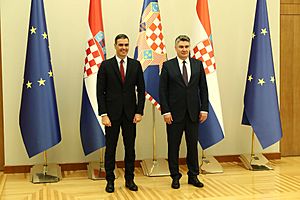
On 24 February 2020, Milanović strongly criticized the burning of a doll showing a same-sex couple with their child at a festival in Imotski. He called it an "inhumane, totally unacceptable act." He demanded an apology from the event organizers. He stated that such actions "deserve the strongest condemnation of the public because hatred for others, intolerance and inhumanity are not and will not be a Croatian tradition." He also asked for action from relevant institutions, especially since many children witnessed the event.
Milanović made his first trip abroad as president on 27 February 2020 to Otočec ob Krki, Slovenia. There, he met with President Borut Pahor. They both agreed to work on improving relations between their countries. They also discussed the border issue, Croatia joining the Schengen Area, and border controls due to the COVID-19 pandemic. Milanović also spoke about Montenegro, Albania, and North Macedonia joining the European Union.

During the summer, Milanović visited Montenegro and met with President Milo Đukanović. He also canceled a planned trip to Russia. In September and October, he had public disagreements with several Croatian politicians, analysts, and journalists, including the Prime Minister Andrej Plenković. He spoke against lockdowns and curfews.
In January 2021, Milanović refused to attend a ceremony for the 1993 Operation Maslenica. This was because symbols of the Croatian Defence Forces were to be displayed. In September 2021, he publicly stated that Bunjevci are Croatians. The national council of Bunjevci strongly disagreed with his statements.
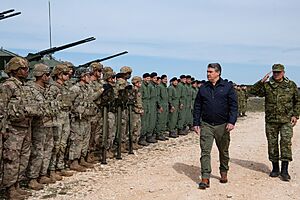
In November 2021, Austria's foreign ministry asked the Croatian ambassador in Vienna, Daniel Glunčić, for an explanation. This happened after Milanović compared the lockdown in Austria to methods used during the time of Nazism.
Views on the Russo-Ukrainian War
In December 2021, Milanović criticized Prime Minister Plenković's visit to Ukraine. This visit happened at the start of a new increase in tensions in the Russo-Ukrainian war. Milanović called the visit "plain charlatanism." The prime minister responded by saying that the government also wanted to maintain good relations with Russia.
Strong reactions from Ukraine's government followed Milanović's statements on 25 January 2022. He said that Ukraine was not ready to join NATO. He also called the 2014 Maidan Revolution in Ukraine a "coup d'état." Ukraine's foreign ministry called the Croatian ambassador. They stated that Milanović's comments repeated Russian propaganda and harmed relations. Russia's state media widely reported Milanović's statements. Croatia's prime minister, Plenković, apologized to Ukraine. In an interview, Milanović refused to apologize and repeated his views. He also said that Prime Minister Plenković "behaved like an agent of Ukraine."
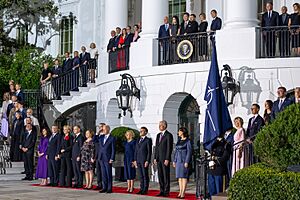
On 1 February 2022, Milanović spoke to the press while the UK defence secretary was in Zagreb. Milanović said he thought Britain was "misleading Ukraine, inciting it, and holding it hostage." He also said Ukraine would "not make itself happy if it listen[ed] to London." He believed that the EU could not be stable without an agreement with Russia. When asked about the Bucha massacre, Milanović said: "That is far away, I know nothing about that." In June, Milanović commented on the war again. He said that "once Russian boot arrives somewhere, it never leaves." In September 2022, Milanović called the EU's Ukraine policy "stupid."
After the Tu-141 drone crash in Zagreb, Milanović ordered a ban on NATO aircraft flights over Zagreb and other Croatian cities. He said the flights "disturb the citizens." This continued his disagreement with Prime Minister Plenković. When the EU announced the possibility of training Ukrainian troops in Croatia, Milanović said he was blocking this decision. He believed it would bring the war to Croatia. In late January 2023, Milanović said that "from 2014 to 2022 we observed how someone provoked Russia, with intent of instigating this war." In March 2023, Milanović stated that Croatia's donation of Mi-8 transport helicopters to Ukraine "will lead to mass bloodshed." In June of the same year, he claimed that "Ustaše were gentlemen in comparison with those who fought by the salute 'slava Ukraini'." In October 2024, Milanović spoke against Croatia's participation in a NATO mission in Germany.
After being re-elected in the 2024–25 Croatian presidential election, Milanović stated that "Ursula von den Leyen and Kaja Kallas are two women that cannot speak on behalf of Croatia." He also said that Moscow would decide which peacekeeping forces would go to Ukraine. He described the idea of sending 30,000 troops to Ukraine as "dreams of the grandchildren of those who led the Crimean War." A few days later, during a visit to Slovenia, Milanović again commented on the war. He said that "the unjust peace is better than the continuation of the war." During his March 2025 visit to Montenegro, Milanović stated that "Russia is a country that 'has made mistakes on many things,' but it does not pose a threat to Europe." He also called the Coalition of the willing "dangerous and irresponsible."
Finnish and Swedish NATO Accession
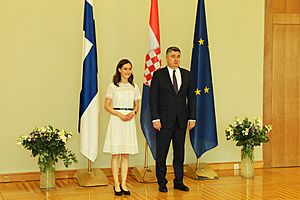
In April 2022, Milanović suggested blocking Finland's and Sweden's accession to NATO. He wanted to do this until an election law in Bosnia and Herzegovina was changed. This law would allow Bosniaks to elect a Croat member of the presidency. He said he would call any Croatian Parliament member a "political traitor" if they voted against NATO expansion. However, on 28 April 2022, Foreign Minister Gordan Grlić-Radman announced that Croatia supported Finland's and Sweden's applications for NATO membership.
On 18 May 2022, Milanović said that Croatia's stance on Finland and Sweden joining NATO should be similar to the status of Croats in Bosnia and Herzegovina. He also said that Turkey's stance on the two countries' membership showed how serious states operate.
After Finland's foreign minister, Pekka Haavisto, said his country was shocked by Milanović's statements, Milanović responded. He said: "Welcome to the club, Mister Foreign Minister. We have been shocked for several years already by your ignorance and rudeness." However, the Finnish Minister for European Affairs later commented that Finland understood Croatia's concerns about the election law in Bosnia and Herzegovina. Despite his earlier comments, Milanović did not veto Finland's and Sweden's NATO accession at the 2022 NATO Madrid summit. In July 2022, the Croatian Parliament officially and unanimously accepted the applications of both Finland and Sweden to join NATO.
Gaza War
In October 2023, Milanović criticized Israel's attacks on the Gaza Strip. He said: "I condemned [Hamas'] murders... but the right to defense does not include the right to revenge and the killing of civilians." In October 2024, he compared "Netanyahu's regime" to Putin. He said that for him, "both Netanyahu and Putin are defendants on International Criminal Court."
2024 Parliamentary Election
On 15 March 2024, Milanović announced he would run for Prime Minister on the SDP list in the parliamentary election. However, the Constitutional Court ruled that Milanović could not be a candidate or actively support the SDP during the campaign unless he resigned from the presidency. Milanović called the ruling "done in a gangster way." In the election held in April, Milanović's Rivers of Justice coalition came in second place. This prevented him from becoming prime minister.
2024–25 Presidential Election
Milanović ran for a second presidential term in December 2024. He came in first place but did not win a clear majority. He received 49% of the vote. This led to a second round of voting in January 2025 against Dragan Primorac of the HDZ. Milanović won the second round, getting 74.69% of the votes. This made him the president of Croatia once again. Milanović's share of the vote was the highest for a presidential candidate in Croatia since the country became independent in 1991.
However, the voter turnout was only 44%. This was the lowest turnout since Croatia gained independence in 1991.
Honours
| Ribbon | Distinction | Country | Date | Location | Notes | Reference |
|---|---|---|---|---|---|---|
| Order of Merit with a collar | 12 December 2022 | Santiago | Highest civil decoration in Chile |
Images for kids
See also
 In Spanish: Zoran Milanović para niños
In Spanish: Zoran Milanović para niños
- Cabinet of Zoran Milanović
- List of international presidential trips made by Zoran Milanović
 | William M. Jackson |
 | Juan E. Gilbert |
 | Neil deGrasse Tyson |


